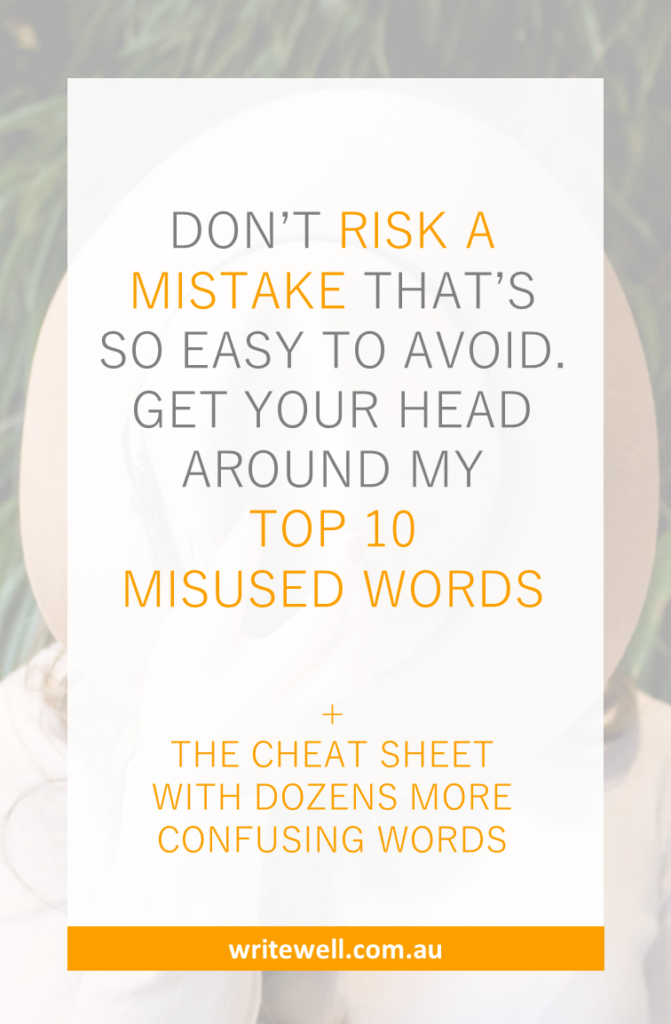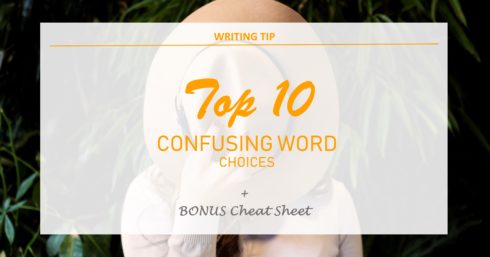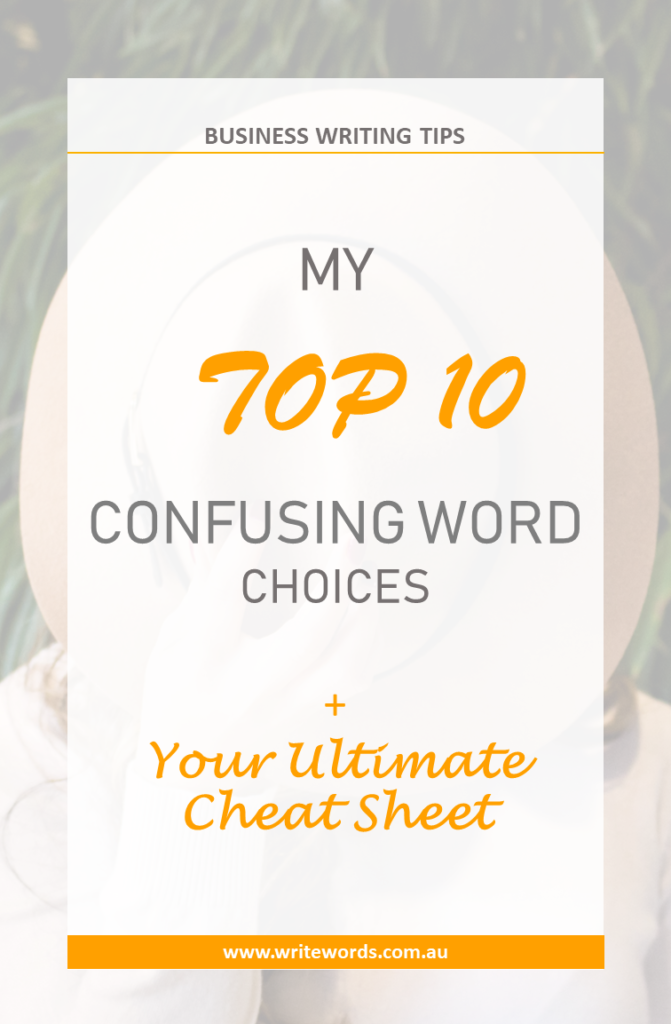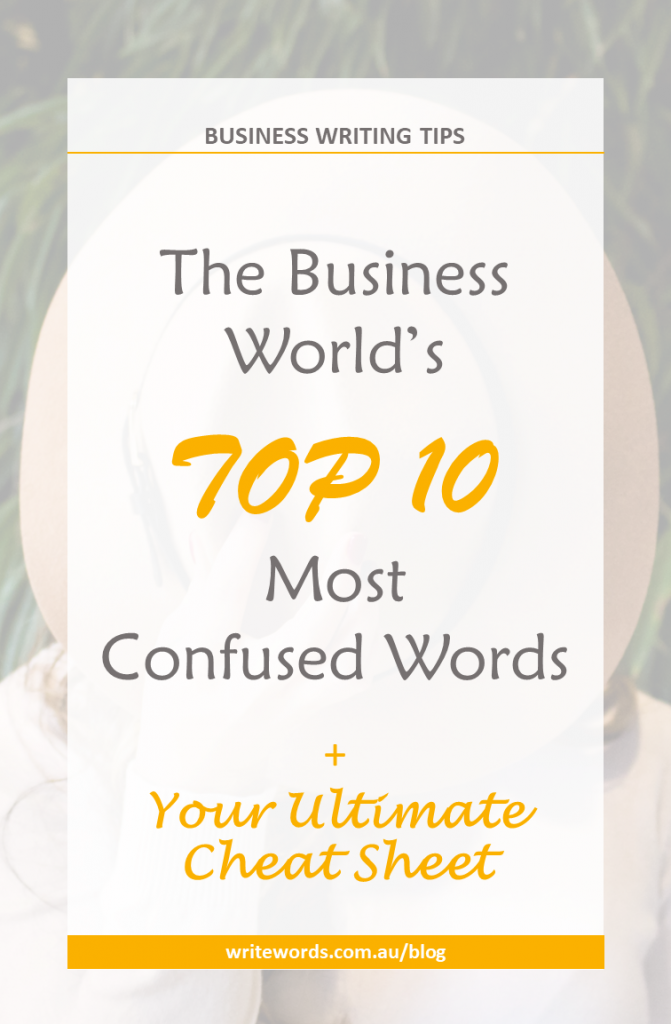10 confusing ‘word choices’
Rules are made to be broken – especially in writing. A little creative license can go a long way when you need to make an impact.
But when it’s unintentional, this can detract from your credibility. Sometimes it’s even cringe-worthy. There’s nothing worse than re-reading a sent email or a published report to find a glaring mistake. Not a simple typo but a ‘confusable’ – demonstrating just how confused you really are.
After 20 years of helping businesses produce their best written communication, I know only too well the ‘word choices’ that constantly confuse. So without further ado, let’s consider the not-so-subtle differences of my top 10 confusing word choices.
And to avoid getting other confusing words wrong, I’ve compiled the ultimate list of misused words.
Download your cheat sheet, and keep it handy when you’re writing.

1. Complimentary v complementary
Complimentary: Free of charge; and an expression of praise or approval.
Complementary: Complete or enhance.
- The conference participants enjoyed complimentary dessert as they discussed services that would complement their businesses.
Tip: Look for the e to complete the spelling of complementary.
2. Definite v defiant
Definite: Certain or unquestionable.
I am definitely going to apply for the contract.
Defiant: Aggressive or bold resistance.
- The chairman defiantly held on to power.
Tip: Definate is definitely not a word.
Download the entire list.
Keep it handy and be confident whenever you face a
word conundrum.
3. Its v it’s
Firstly, its’ is not a word – and should never be used.
The other two? A little confusing – especially when you so often see them used incorrectly.
Its: The possessive form of it. In most cases, apostrophes indicate ownership/possession. However its is a rare exception.
- The CEO resigned as soon as the company lost its main investor.
It’s: It is or it has. The only time an apostrophe should be used with it is to signify a contraction (shortened form) of it is or it has.
- It’s been a week since you met, so it’s time to follow up with a phone call.
Tip: To check you’ve used the correct word, spell any abbreviated words out in full. You’ll know immediately if you’ve got it wrong:
- The CEO resigned as soon as the company lost it’s main investor.
- The CEO resigned as soon as the company lost it is main investor.
4. Lead v lead v led
Lead: To guide, direct or show the way.
- The troublesome intern will lead the young team members astray.
- The injured player is leading the team to victory.
- The motivational speaker will lead you through a series of exercises.
Led: Past tense of lead (above).
- The troublesome intern led the young team members astray.
- The injured player led the team to victory.
- The motivational speaker led you through a series of exercises.
Lead: A toxic metal.
- Lead is a highly toxic metal found in small amounts in the earth’s crust. Source: NIEHS
5. Personal v personnel
Personal: Private or individual.
- The woman’s personal belongings were among the items stolen from the office.
Personnel: People employed in an organisation or business – eg, staff.
- All personnel were to report to the commanding officer prior to boarding the ship.
- The receptionist accidentally sent the CEO’s personal email to all personnel.
Download the ultimate list.
Keep it handy and be confident whenever you face a
word conundrum.
6. Principle v principal
Principle: A standard, law or rule.
- The white paper’s environmental principles were deemed insubstantial.
- The moral principle overrides the legal implications.
Principal: The head of an organisation or school; the main person or factor.
- The principal of the law firm decided to partner with two associates.
- Misbehaving students no longer report to the school principal.
- The principal actor did not take to the stage until the final scene.
7. Then v than
Then: Relating to time or sequence.
- We will meet with you and then we will meet with our supplier.
Than: Used for comparison.
- Your services are more expensive than your competitors’.
Tip: Then can be substituted with next.
- We will meet with you. Next, we will meet with our supplier.
If the substitution doesn’t work, you should use than.
8. There v their v they’re
Their: Belonging to them – possessive of they.
- The staff at the regional office had their own set of procedures.
There: That place – not here; there is also used as a ‘filler word’ at the start of a sentence, but this usually results in wordy writing, so best to avoid.
- The man was hiding over there when thieves broke into the office.
They’re: A contraction (shortened form) of they are.
- They’re moving into their new office next week.
9. Were v we’re v where v wear
Were: The past tense of the verb be – you will be, you are, you were.
- The finance and marketing teams were at the top of the workplace communication leader-board.
We’re: A contraction (shortened form) of we are.
- We’re hopeful the new contract comes into effect next week.
Where: To avoid confusing grammatical theory, let’s cut straight to the examples!
- Where are you going?
- Where is this meeting heading?
- This is where I live.
Wear: To have on the body, eg, clothing*; clothing/attire; damage/erosion**.
- *I prefer not to wear a suit to meetings.
- **The weather will wear the cliffs away.
One more example
- The three company secretaries were wearing matching suits to the conference, where they presented their new web application. “We’re proud to present…”
Download the ultimate list.
Keep it handy and be confident whenever you face a
word conundrum.
10. Your v you’re
Your: The possessive of you.
- Your business partner accidentally took your phone.
You’re: A contraction (shortened from) of you are.
- You’re our favourite supplier because your service is outstanding.
Which ‘confusables’ are you most confused – or frustrated – by? Comment below.
Receive more writing tips – free into your inbox. Sign me up!
Share the love!
Like this writing tip? Share it with your friends and colleagues.



